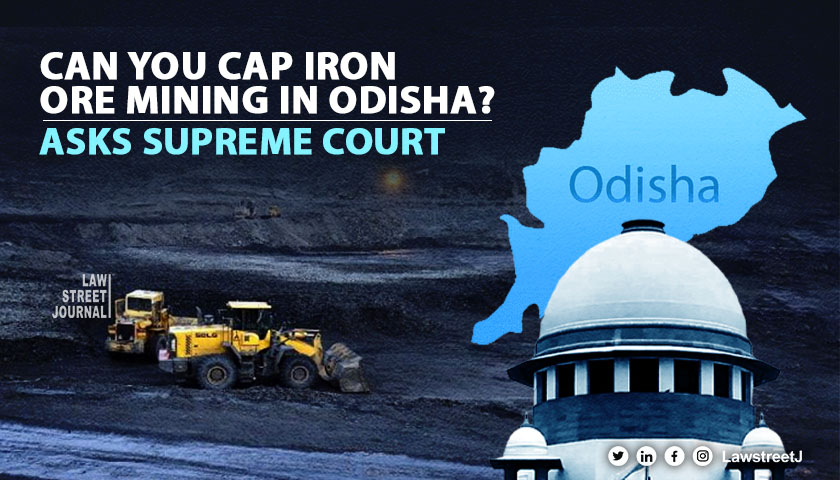NEW DELHI: The Supreme Court on Monday asked the Union government's Ministry of Environment, Forest and Climate Change (MoEFCC) to clarify its stand on putting a cap on iron ore mining in Odisha, in order to ensure "sustainable development and inter generational equity".
The top court was apparently dissatisfied by the Ministry of Mine's response that no limit on extraction of iron ore was required.
A bench of Chief Justice of India D Y Chandrachud felt that MoEFCC, being an expert body, should apprise it about the impact of mining on the environment and the concept of intergenerational equity.
The bench, also comprising Justices J B Pardiwala and Manoj Misra, sought to know if the MoEFCC was consulted by the Ministry of Mines on the issue.
The court was hearing a plea by NGO 'Common Cause'.
Additional Solicitor General Aishwarya Bhati, appearing for the Union government said the Ministry of Mines has filed an affidavit.
In its response, the Ministry of Mines said that steel being an important pillar in achieving the economic goals of the nation and in making India self-reliant, any such capping would be highly detrimental towards achieving the common developmental goals of the nation.
"Putting a cap on production of a mineral in a particular state, which is resource rich in that commodity, will jeopardise the economic development of the nation, mineral availability for the downstream industries and the requirement to sub-serve the huge population base of the country, it said.
The bench noted that the Ministry of Mines has examined the matter in the light of the quantum of iron ore resources in the country and the cap imposed in Karnataka and Goa.
However, it posed a question whether in the present situation, Odisha also required a capping.
"The MoEFCC has to apply its mind and tellthat is the expert ministry dealing with the environment," the bench said.
The bench also pointed out the Union Ministry of Mines' response
does not have the view of the Environment Ministry.
Bhati said current per capita consumption of India is 158 kgs, whereas the current global average is 208 kgs. She also referred to the court's attention to zero waste mining.
Senior advocate A D N Rao, acting as amicus curiae in the matter, said in Karnataka and Goa, the CEC had examined it and then recommended for a cap.
Senior advocate Rakesh Dwivedi, representing the Odisha government, opposed Raos view.
He said the affidavit clearly points out while the consumption has grown at the same time the availability of the resources has also grown.
71% of the OGP (obvious geological potential) area that is the area where prospecting is done.it (iron ore) is known that it is available there but it is not being mined.that is still available. That is intergenerational equity," Dwivedi said.
He said that iron ore leads to production of steel, which is important for defence and all industries. He said the steel is the backbone of several industries, including Railways.
He insisted that any curtailment would mean that the future will suffer and intergenerational equity should not be looked at from the point of view of a particular resource only.
Advocate Pranav Sachdeva, for the NGO 'Common Cause', submitted that the iron ore is set to be exhausted in 25 years keeping in mind the present pace of mining and insisted for the court's direction on capping on iron ore.
We want the view of the MoEFCC. This ministry is the expert body and it can tell us about the impact of the iron ore mining on the environment and the concept of intergenerational equity, the bench said.
Bhati agreed to file the affidavit by MoEFCC.
The court also directed the Odisha government to file a fresh affidavit in four weeks giving details of recoveries of dues from defaulter mining firms, which were held guilty of violating norms, from the last order passed on August 14, 2023. The apex court also asked the state government to provide the details of properties of mining firms which were attached for recovering the dues.
In its order August 14, 2023, the court had said, The Union of India shall consider the position and decide whether a cap on mining is necessitated in the case of State of Odisha and, if so, the modalities to be followed for determining such a cap. In arriving at its decision, the Union of India shall also examine the basis on which a cap was imposed in the States of Karnataka and Goa.
The Odisha government had said that this year, it had recovered a substantial amount in fines from the defaulting mining firms but Rs 2,622 crore was yet to be collected from them.
















